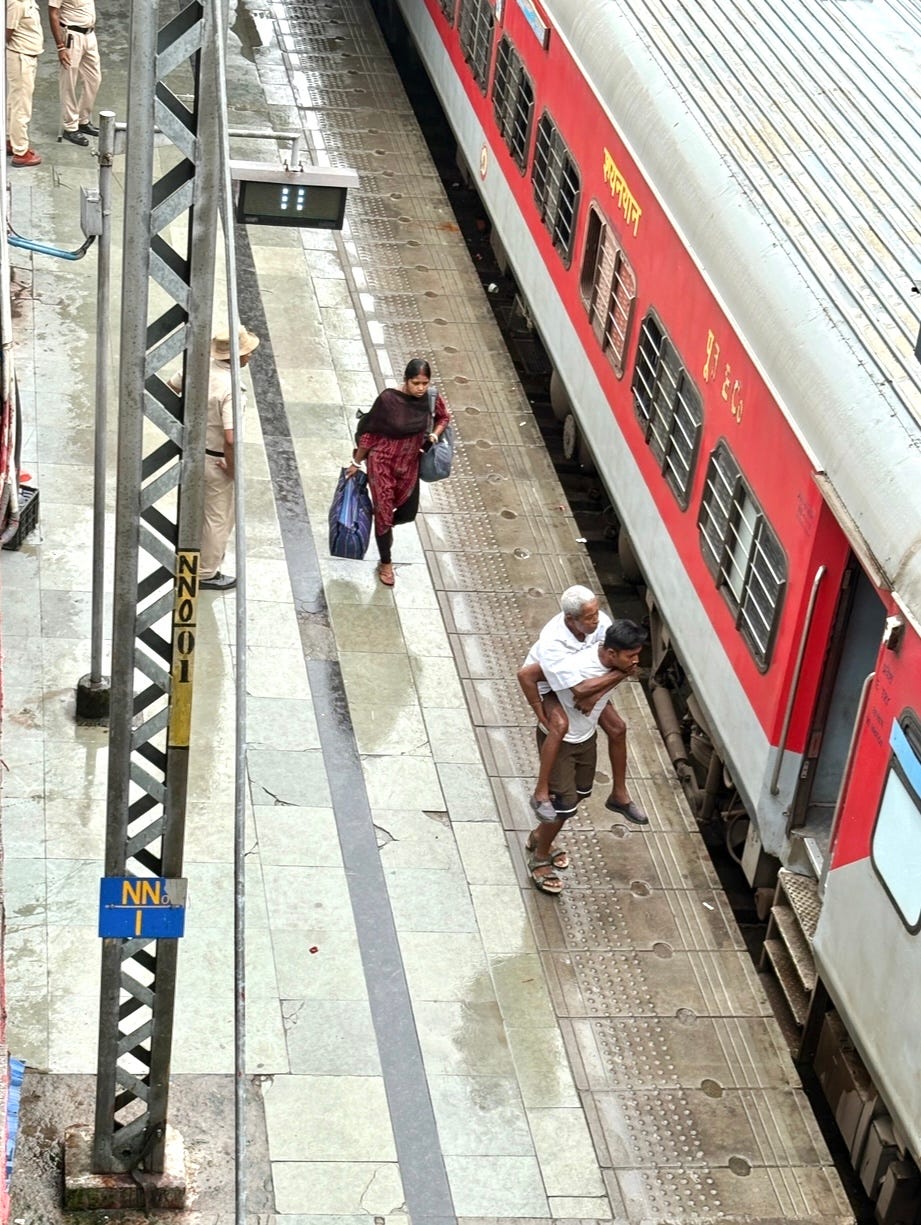The Unified Theory of Train Travel
Reporting from Darjeeling
I have come to Darjeeling at a bad time. The train that brought me here yesterday, trundling slowly up from near sea-level to a height of 6,709 feet, was delayed by several hours. But the delay wasn’t the problem for everyone. Instead, it was the incessant rain. I took a train again today, this time to Ghum, the highest railway station in India. Clouds swirled around us and visibility was poor. No chance, of course, of seeing the Himalayan mountain tops. Frankly, I hadn’t come here to see the Kangchenjungha. My aim was to engage in train travel. So, at Ghum, I drank some excellent tea that a young woman was selling on the platform. I was quite content and now I want to offer you my theory about train travel in India.
It is only in India that we get to witness in a stark, often dramatic, form how we take care of the old and the sick. The state won’t be there to lend a helping hand, and as we move farther away from the metropolises, there is a paucity of other resources too. (I was conscious last week that my Chachi could not call an ambulance in Bettiah to take my Chacha to a doctor when he was gasping for breath. There were no ambulances to call.) The point I’m making here is that you can be at a train station in a town and you suddenly see a young man carrying his father on his back. That is what I saw yesterday at the New Jalpaiguri station. I offer my theory from decades of observing people at the railway stations in India, what is always available is a mixture of frailty and strength that I always find very moving.
Today’s travels brought to light something else. I was on what the railway calls a “joy ride,” a trip to nearby stations in a loop. There were several stops during the ride that lasted an hour and forty minutes. All this while, I was looking at people looking at themselves. In fact, I’d point my phone to take a picture and there would almost always be another phone in the frame taking a photo or recording a video. Here are two images from my huge achive of people dressing up and taking pictures.
I said above that when you go to the train stations in India, you are struck by the sight of people helping each other and that the state is often missing. I think I was overstating. If you look at the picture above from New Jalpaiguri, with the young man carrying his father, you will see at the edge of the image the brown uniforms of the officers of the Railway Police Force. A few minutes after I took this picture, several women passed me in a rush. They were late for the train. I looked down and saw that the train had begun to move: I was sure that these women wouldn’t be able to make it. Then I looked down again and noticed that a lone woman with an infant in her arms was running. She was trying to jump on the moving train. But one of the RPF staff, a female officer whose name I later learned was Dipendry Singha, ran after the woman and held her back from attempting to do something that could have proved very dangerous. In the meantime, the bunch of middle-aged women who had been late had also reached the platform and, this was a surprise, the train slowly came to a halt. The guard was going to allow the late passengers to board the train. A happy ending for all.







There’s something quietly dignified in the way you entered this journey not chasing the view, not resisting the delays, but allowing the experience to unfold as it wished. I felt the mist in your words, the weight of stillness, and the warmth of that tea.
Your theory of train travel, I suspect, goes far beyond geography it invites us to move without urgency, to notice without naming and to be reshaped by what we do not control. Thank you for reminding me that presence is a destination too.
What a remarkable piece, not least because having encountered the phrase, ' father being carried by his son,' we then get the image itself. (" a young man carrying his father on his back," is the exact quote, make of my embellished version what you will.)
The ending is just amazing. I mean the fact of the train stopping.
I must say, the restrained mother and child... in that moment her feelings towards Dipendry Singha* might have been rather antagonistic. We don't know why she needed to catch that train so badly, after all.
*And the story of how you got the name? How you explained your asking for it? That is perhaps to come.